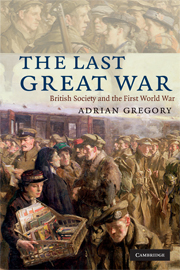Book contents
- Frontmatter
- Contents
- Illustrations
- Acknowledgements
- Introduction: The war that did not end all wars
- 1 Going to war
- 2 Defining the enemy: Atrocities and propaganda 1914–1915
- 3 From spectatorship to participation; From volunteering to compulsion 1914–1916
- 4 Economies of sacrifice
- 5 Redemption through war: Religion and the languages of sacrifice
- 6 The conditional sacrifices of labour 1915–1918
- 7 Struggling to victory 1917–1918
- 8 The last war?
- Conclusion
- Notes
- Index
7 - Struggling to victory 1917–1918
Published online by Cambridge University Press: 05 June 2014
- Frontmatter
- Contents
- Illustrations
- Acknowledgements
- Introduction: The war that did not end all wars
- 1 Going to war
- 2 Defining the enemy: Atrocities and propaganda 1914–1915
- 3 From spectatorship to participation; From volunteering to compulsion 1914–1916
- 4 Economies of sacrifice
- 5 Redemption through war: Religion and the languages of sacrifice
- 6 The conditional sacrifices of labour 1915–1918
- 7 Struggling to victory 1917–1918
- 8 The last war?
- Conclusion
- Notes
- Index
Summary
The Christmas crisis
Ever since August 1914, our capital, once the blithest and jolliest city in Europe has been in danger of being Prussianised … not of course by the enemy, but by the scarcely less disagreeable Puritans in our midst.
In the course of 1917 the strains of war were creating a widespread sense of gloom. The journalist Charles Sheridan-Jones, in a book published that year, complained of a ‘plague of regulations under which the most harmless things had become “verboten” ’. In the capital it had become impossible ‘to get a whisky after nine-thirty or cigarettes after eight’, and that ‘the shopkeeper who sells you chocolate may face a ruinous penalty’.
Small symbolic changes could indicate wider issues. Looking back, Dorothy Peel remembered of the winter of 1917–1918, ‘the world was poorer for the disappearance of the muffin’: an institution of her domestic life had ceased to exist. That winter was the winter of the queue: ‘anyone who penetrated the poorer neighbourhoods became familiar with the queue’. Initially this was a burden which fell on the working class, but soon, ‘the middle classes who could not obtain servants also swelled the queue’. By early 1918, ‘women used to go from shop to shop trying to find one at which they could buy meat or margarine’.
The low point in public confidence was between October 1917 and February 1918. The prospects never seemed bleaker.
- Type
- Chapter
- Information
- The Last Great WarBritish Society and the First World War, pp. 213 - 248Publisher: Cambridge University PressPrint publication year: 2008
- 1
- Cited by



